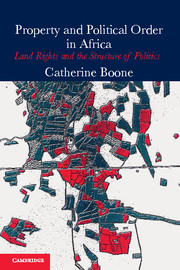Book contents
- Frontmatter
- Dedication
- Contents
- List of Figures, Tables and Maps
- Preface and Acknowledgments
- 1 Introduction
- Part I Property Rights and the Structure of Politics
- 2 Land Tenure Regimes and Political Order in Rural Africa
- 3 Rising Competition for Land
- Part II
- Part III
- Part IV
- Appendix Land Politics Cases and Sources
- References
- Index
2 - Land Tenure Regimes and Political Order in Rural Africa
Published online by Cambridge University Press: 05 June 2014
- Frontmatter
- Dedication
- Contents
- List of Figures, Tables and Maps
- Preface and Acknowledgments
- 1 Introduction
- Part I Property Rights and the Structure of Politics
- 2 Land Tenure Regimes and Political Order in Rural Africa
- 3 Rising Competition for Land
- Part II
- Part III
- Part IV
- Appendix Land Politics Cases and Sources
- References
- Index
Summary
It is important to remember that the distribution of land is akin to the distribution of power.
(Kiggundu 2007)Les hommes sont beaucoup plus facile à contrôler en monde rural.
(An Ivoirian economist, Abidjan, October 2011)For political analysts working within the closely defined frame of formal political institutions such as legislatures and electoral systems, structures of government and social organization in rural Africa have been nearly indecipherable. In most of rural Africa, transparent forms of socioeconomic accounting – such as tax rolls, social security records, and land registries – are absent, incomplete, or outdated. The nature and distribution of asset holding are opaque. Formal institutions and opinion registers that would allow outsiders to identify competing rural interest groups, their representatives, and their policy preferences are few and far between. Latifundia and landholding aristocracies that are recognizable from afar are absent, giving rise to the stereotype of rural Africa as strongly egalitarian.
African governments themselves have often claimed that custom and tradition prevail where modernity is held at bay, and they have promoted the image of rural communities as existing in a premodern state of social equality and political inertia. Most political analysts have not looked for or seen structural differentiation and institutionalized political forms in rural Africa; many seem to have simply assumed the absence thereof. In public opinion polling and some election studies, for example, rural African voters are often modeled as ethnicity-driven individuals (or groups) who act in an unstructured and institutionless political space. Patterned outcomes, such as the persistent salience of ethnic cleavages in voting, the structure of patronage hierarchies, the scope and limits of state penetration of local life, and even outbursts of violent conflict, are thus often attributed to cultural and ideational factors – and especially to the exaggerated role of ethnic identity in political life. This bias in approach leaves the institutional and structural factors that shape rural political behavior largely uninvestigated and untheorized.
- Type
- Chapter
- Information
- Property and Political Order in AfricaLand Rights and the Structure of Politics, pp. 19 - 51Publisher: Cambridge University PressPrint publication year: 2014
- 1
- Cited by



